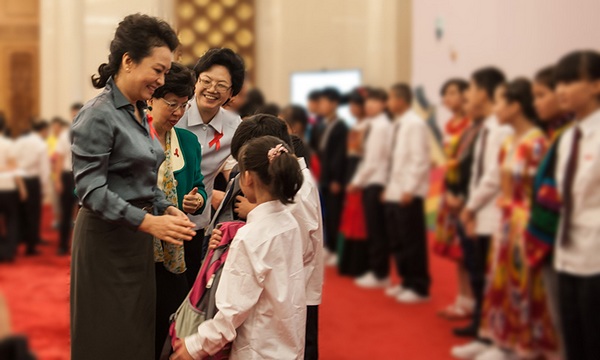

You wouldn't know by looking at Feifei that she is HIV positive.
The tall, 15-year-old girl with a ponytail, originally from a mountain village in Yunnan province, now goes to middle school in a county three hours from home by bus.
 |
|
First lady Peng Liyuan, who also serves as ambassador for the National Health and Family Planning Commission for HIV/AIDS control and prevention, together with (from left to right) Director-General of the WHO Margaret Chan and Li Bin, director of the commission, greet children with HIV/AIDS at the opening of a summer camp on Aug 20, 2013. More than 30 children attended the event held by the Chinese Association of STD and AIDS Prevention and Control. [Photo provided to China Daily] |
Every day at 8:10 am, during the morning reading session, she swallows three antiretroviral therapy pills.
"I take the medicine behind the book without drinking water because I don't want my classmates to see," she said.
At first, her mother said it was just tuberculosis and told her the truth last year when she had a boyfriend.
"I learned that I got the virus from her and began to hate her," she recalled.
But the hatred didn't last long as she saw her mother working so hard selling fruit to support her education.
"I don't want to think or know much about the disease — it might make me feel desperate," she said.
"I'm a bit worried that my condition might affect a future relationship," she said.
Yin Zuyan, Feifei's doctor, said she feels at a loss, particularly when young patients like Feifei ask her about relationships. "Becoming a teenager and entering puberty, naturally they are longing for a relationship. It is extremely hard to give any advice," she said.
Moreover, other mental problems like depression and anxiety tend to arise when the patients enter their teens, she said.
"They begin to formally identify the disease and its potential effect then, which might worsen their adolescent rebellion," said HIV/AIDS expert Zhao Yan.
Zhao Yan, deputy director of the AIDS treatment and care division of the National Center for AIDS and Sexually Transmitted Disease Control and Prevention, said effective AIDS treatment is more than medication: Proper and timely mental counseling is equally important, especially for children.
To date, China has 8,000 children living with HIV/AIDS across the mainland, about 1.2 percent of the cases, statistics from the center showed. Most got the virus from their mothers.